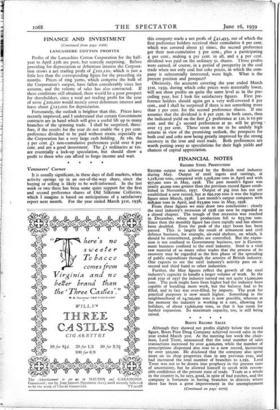V.O.C. PRODUCTION POLICY Sir Andrew Agnew had several interesting things
to say about oil consumption as well as the company's production programme at the meeting of Venezuelan Oil Concessions. He contrasted the absence of any material increase in world oil consumption in 1938, in spite of the large quantities taken by various Governments in consequence of expanding rearma- ment schemes, with the average expansion of about 8 per cent. in previous years. This he attributed to the depressing effect on consumption of a lower volume of normal business activity,, itself the result largely of political uncertainty ; hence his unwillingness to budget on any really substantial rise in oil consumption until general economic conditions become more stable. This estimate of world demand has, it seems, been an important factor in the board's decision to apply the brake to the company's development programme, which last year enabled production to be raised by 15 per cent.
This year, Sir Andrew emphasised, is to be one of con- solidation rather than fresh expansion, so that it should not be inferred from the rise in output achieved so far that the total for 1939 will exceed that of 1938. Last year's develop- ment work has built up a greatly increased production capacity, so that fresh development can be safely curtailed with a consequent saving in expenditure. I am not sur- prised, however, that Sir Andrew refrained from venturing any forecast of the earnings for 1939. Quite apart from the uncertainties surrounding selling prices—which should not be very serious this year—this company is obviously faced with two major problems. First, there is the unassessable charge of special labour and other costs which reached what seem to me to be really alarming proportions in the 1938 accounts, and, second, there is the exchange factor. All in all, I think the market is justified in keeping V.O.C. shares on a high yield basis for the present.
(Continued on page 1068)
FINANCE AND INVESTMENT
(Continued from page io66) LANCASHIRE COTTON PROFITS Profits of the Lancashire Cotton Corporation for the half- year to April 25th are poor, but scarcely surprising. Before providing for depreciation or debenture interest the Corpora- tion shows a net trading profit of £101,121, which is just a little less than the corresponding figure for the preceding six months. Prices of ring yarns, which comprise the bulk of the Corporation's output, have fallen considerably since last autumn, and the volume of sales has also contracted. If these conditions still obtained, there would be a poor prospect for shareholders, since a total net trading profit for the year of some £200,000 would merely cover debenture interest and leave about L125,000 for depreciation.
Fortunately, the outlook is brighter than this. Prices have recently improved, and I understand that certain Government contracts are in hand which will give a useful lift up to many branches of the spinning trade. I shall be surprised, there- fore, if the results for the year do not enable the 5 per cent. preference dividend to be paid without strain, especially as the Corporation has a very large cash holding. At 16s. the 5 per cent. LI non-cumulative preferences yield over 6 per cent. and are a good investment. The LI ordinaries at IQs. are essentially a lock-up speculation, but should show a profit to those who can afford to forgo income and wait.























































 Previous page
Previous page